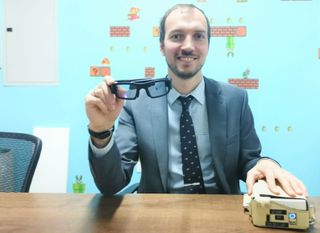NNTC embraces disruptive technologies to solve industry problems
UAE-based company focuses on software development and its solutions are used by governments and enterprises

Digital transformation is gaining pace in the Middle East as companies are using the investment to drive adoption of more disruptive technologies such as artificial intelligence, robotic process automation, internet of things, video and big data analytics, VR, AR and drones.
Companies are using technology to cut cost and drive more efficiency.
According to ESG research, 92% of organisations surveyed in the Middle East use at least one emerging technology in production today compared to 84% globally.
The more emerging technologies a business uses, the faster it grows its bottom line.
“Organisations using the most emerging technologies in the Middle East have grown their annual revenues 58% faster than organisations not investing in these technologies while organisations using the most emerging technologies have grown their net income 48% faster than organisations not investing in these technologies,” the report said.
To cash in on the growing trend, a UAE-based IT solution provider, software developer and training services company NNTC is embracing cutting-edge technologies to solve industry problems.
Dmitry Doshaniy, General Manager of NNTC, said that although the digital revolution has streamlined the adoption of innovations, lack of IT professionals could dramatically reduce the return on technology investment.
Are you a pro? Subscribe to our newsletter
Sign up to the TechRadar Pro newsletter to get all the top news, opinion, features and guidance your business needs to succeed!
The company started in the UAE with IT-related training business but did not take off owing to the stiff competition but its Bahrain unit is doing well.
“We shifted our focus on software product development in emerging technologies in the UAE and worked with iFalcon facial recognition product. There is a big drive for innovation in the UAE, especially Dubai, and want to be at the forefront of technology,” he said.
The AI and cognitive market in the UAE is set to grow between 25% and 30% year over year in the next two to three years. The impact of AI, along with 5G and IoT, will be extremely powerful.
- Jibrel aims to bring tokenisation of traditional financial assets to life
- Dubai-based Blue Logic is cashing in on growing need for chatbot solutions
- Qafila aims to become the Careem of UAE's freight forwarding industry
Finding new resources
Doshaniy said that government agencies and corporations have the desire to try things and do something quicker than their counterparts within and outside the country.
“This has worked quite successfully for us and not limited just to the UAE. We have customers in Saudi Arabia, Oman, Egypt and India,” he said.
NNTC’s proprietary iFalcon facial recognition product has a wearable server and a wearable glass with a see-through display and a camera.
The wearable glass is from Vuzix while the server is built by the company locally with Intel components inside.
“We get marketing and technical support from Intel to scale up globally,” he said.
He said that the engine detects, captures and recognises multiple faces per second, and can be effectively used by law enforcement officers in crowded areas and at critical infrastructure facilities.
“The idea is to have facial recognition on the go for police and law enforcement officials to catch wanted culprits or missing people. It will alert the cops once the match is found and displayed on glass. The database can hold 1m faces. It can identify 15 faces per frame per second and is capable of identifying an individual in less than a second,” he said.
NNTC has also done a mobile attendance for a construction company and uses the smartphone to scan the faces of the people before and after the shift, instead of the fingerprint scanner.
Doshaniy said that facial recognition is much easy and contactless.
The company has developed a software platform for industrial safety using video analytics and AI known as ‘Digital Worker’.
“We can detect multiple conditions such as people not wearing helmets, glasses or doing something that is prohibited by using cameras,” he said.
Furthermore, he said that VR is the ideal solution to train operational staff at heavy industries at a lower cost and with higher efficiency than the traditional classroom learning.
The company has developed solutions for unmanned drones for monitoring and is used by many industries, including governments in the UAE.
Doshaniy said that the company has plans to enter into North Africa and European markets but the main focus will be to boost its customer base.
“We have grown more than 100% growth in the last two years and expect similar growth this year also,” he said.
Most Popular

